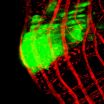(Press-News.org) During cell division, chromosomes acquire a characteristic X-shape with the two DNA molecules (sister chromatids) linked at a central "connection region" that contains highly compacted DNA. It was unknown if rearrangements in this typical X-shape architecture could disrupt the correct separation of chromosomes. A recent study by Raquel Oliveira, from the Instituto Gulbenkian de Ciência (Portugal), in collaboration with colleagues from the University of California, Santa Cruz (USA), now shows that the dislocation of particular DNA segments perturbs proper chromosome separation. The results of this study, published now in the open access journal PLOS Biology*, raise the possibility that chromosome rearrangements involving these regions, often seen in many cancers, can induce additional errors in cell division and thereby compromise genetic stability.
The key to understand this problem lies on the "glue" that keeps the two sister chromatids together. This gluing occurs by the action of proteins called cohesins that are usually enriched at the compact "connection region". In this study, researchers monitored cell division in different strains of the fruit fly Drosophila melanogaster that carry chromosomes with misplaced sections of highly compacted DNA. Their results indicated that the inappropriate location of these chromosomal regions is sufficient to load the cohesion "glue", leading to the formation of additional connections between sister-chromatids. As cell division proceeds and the sister chromatids are pulled to opposite poles of the cell, the presence of these extra cohesion sites leads to abnormal chromosome stretching as it is harder to "unglue" the chromatids.
Raquel Oliveira, first author of this study, explains: "Many cancer cells have these type of chromosomal abnormalities and we now show that this can bring additional problems every time a cell divides". William Sullivan (UCSC), collaborator of this work, adds: "Like a car with its engine out of tune, over many cell divisions this is likely to result in severe disruptions in chromosome organization".
"When we started this work, I was initially interested in understanding how the "glue" was loaded onto these abnormal chromosomes. My colleague Shaila Kotadia (UCSC), co-first author of this work, was investigating chromosome segregation defects in these fruit fly strains. We soon realized that the two questions were potentially linked and joint efforts to dissect how and why cell division was affected in these cells", says Raquel Oliveira. These experiments started during Raquel's post-doctoral work at the University of Oxford and were concluded after her move to the IGC.
INFORMATION:
Raquel Oliveira, group leader at IGC since 2012, received last year an EMBO Installation Grant, awarded by the European Molecular Biology Organisation (EMBO).
This research was developed in collaboration with researchers from the Department of Molecular, Cell and Developmental Biology (University of California, Santa Cruz, USA) and Department of Biochemistry (University of Oxford, UK). This research was funded by a Marie Curie Career Integration Grant, European Union, National Institutes of Health (NIH; USA) and California Institute for Regenerative Medicine (USA).
*Oliveira, R. A., Kotadia, S., Tavares, A., Mirkovic, M., Bowlin, K., Eichinger, C.S., Nasmyth, K., Sullivan, W. (2014). Centromere-independent accumulation of cohesin at ectopic heterochromatin sites induces chromosome stretching during anaphase, PLOS Biology, doi/10.1371/journal.pbio.1001962
Link: http://www.plosbiology.org/article/info:doi/10.1371/journal.pbio.1001962
Gluing chromosomes at the right place
New study reveals mechanism that compromises chromosome stability
2014-10-08
ELSE PRESS RELEASES FROM THIS DATE:
Fine-tuning of bitter taste receptors may be key to animal survival
2014-10-08
One key to animal survival is bitter taste----the better to avoid ingesting potentially harmful poisons or foods. The evolution of bitter taste has been a hot topic amongst evolutionary biologists, and with more and more DNA data available, a rich area of exploration.
Now, professor Maik Behrens, et. al. examined the genetic repertoire of bitter taste receptor genes in chickens and frogs, which represent two extremes. Chickens only have 3 bitter taste receptor genes (Tas2rs), while frogs have more than 50 (humans are somewhere in the middle). They studied the different ...
Dietary fat under fire
2014-10-08
This news release is available in French. The association between saturated fat and cardiovascular risk has become a hot topic in nutrition. Researchers at the Institute of nutrition and functional foods (INAF) of Université Laval are calling for a review of dietary recommendations on saturated fat (SFA) in relation to cardiovascular disease (CVD).
In a Comment paper, published today in the journal Applied Physiology, Nutrition, and Metabolism the authors provide a number of arguments for the urgency to re-assess the association between dietary saturated fat ...
Flies with colon cancer help to unravel the genetic keys to disease in humans
2014-10-08
Researchers at the Institute for Research in Biomedicine (IRB Barcelona) have managed to generate a fruit fly (Drosophila melanogaster) model that reproduces human colon cancer. With two publications appearing in PLoS One and EMBO Reports, the IRB team also unveil the function of a key gene in the development of the disease.
"The breakthrough is that we have generated cancer in an adult organism and from stem cells, thus reproducing what happens in most types of human cancer. This model has allowed us to identify subtle interactions in the development of cancer that are ...
Fruit flies reveal features of human intestinal cancer
2014-10-08
HEIDELBERG, 8 October 2014 – Researchers in Spain have determined how a transcription factor known as Mirror regulates tumour-like growth in the intestines of fruit flies. The scientists believe a related system may be at work in humans during the progression of colorectal cancer due to the observation of similar genes and genetic interactions in cultured colorectal cancer cells. The results are reported in the journal EMBO Reports.
Colorectal cancer leads to more than half a million deaths worldwide each year. The disease originates in the epithelial cells of the ...
Supervisors' abuse, regardless of intent, can make employees behave poorly
2014-10-08
SAN FRANCISCO, Oct. 8, 2014 -- Employees who are verbally abused by supervisors are more likely to "act out" at work, doing everything from taking a too-long lunch break to stealing, according to a new study led by a San Francisco State University organizational psychologist.
Even if the abuse is meant to be motivational -- like when a football coach berates his team or a drill sergeant shames her cadets -- the abused employees are still more likely to engage in counter-productive work behaviors, said Kevin Eschleman, assistant professor of psychology at SF State.
The ...
Large chain restaurants appear to be voluntarily reducing calories in their menu items
2014-10-08
New research from the Johns Hopkins Bloomberg School of Public Health finds that large chain restaurants, whose core menu offerings are generally high in calories, fat and sodium, introduced newer food and beverage options that, on average, contain 60 fewer calories than their traditional menu selections in 2012 and 2013.
Researchers say this could herald a trend in calorie reduction in anticipation of expected new federal government rules requiring large chain restaurants – including most fast-food places – to post calorie counts on their menus. The appearance ...
Universal screening for MRSA may be too costly
2014-10-08
PHILADELPHIA – (Oct. 8, 2014) – Numerous experts and policy makers have called for hospitals to screen patients for methicillin-resistant Staphylococcus aureus (MRSA) infections and isolate anyone testing positive to prevent the spread of these so-called "Superbugs" in healthcare settings. Several states have enacted laws requiring patients be screened for MRSA upon admission.
Two new abstracts, scheduled for presentation on Friday at IDWeek, the annual scientific meeting for infectious disease specialists, found universal MRSA screening and isolation of ...
Childhood eating difficulties could be a sign of underlying psychological issues
2014-10-08
This news release is available in French. Researchers at the University of Montreal and its affiliated CHU Sainte-Justine children's hospital are warning parents that difficult eaters could have underlying psychological issues, as they have found that restrictive behaviours can appear before puberty. "Many researchers believe that bulimia only appears at adolescence, but our studies indicate that the problem can arises much earlier. It is possible that it is currently under-diagnosed due to a lack of awareness and investigation," explained clinical psychologist and ...
How dinosaurs divided their meals at the Jurassic dinner table
2014-10-08
How the largest animals to have ever walked the Earth fed, and how this allowed them to live alongside one another in prehistoric ecosystems is the subject of new research from the University of Bristol and the Natural History Museum, London.
The sauropods – large, long-necked plant-eating dinosaurs such as Diplodocus and Brachiosaurus – dominated the land between 210 and 65 million years ago. They were the largest land animals of all time, with the biggest weighing 80 tonnes (more than 11 elephants) and would have needed vast amounts of food.
Despite ...
The Lancet Psychiatry: Schools key to reaching the 1 in 10 children with mental health problems
2014-10-08
Schools are a vital way of reaching the 10–20% of children and young people across the globe who would benefit from some sort of mental health intervention, according to a new Series on mental health interventions in schools published in The Lancet Psychiatry.
The Series highlights that childhood is an important window for intervention because around 75% of adults who access mental health services have had a diagnosable disorder before the age of 18 [1]. What is more, estimates from high-income countries (HICs) indicate that only 25% of children with a mental health ...
LAST 30 PRESS RELEASES:
The wild can be ‘death trap’ for rescued animals
New research: Nighttime road traffic noise stresses the heart and blood vessels
Meningococcal B vaccination does not reduce gonorrhoea, trial results show
AAO-HNSF awarded grant to advance age-friendly care in otolaryngology through national initiative
Eight years running: Newsweek names Mayo Clinic ‘World’s Best Hospital’
Coffee waste turned into clean air solution: researchers develop sustainable catalyst to remove toxic hydrogen sulfide
Scientists uncover how engineered biochar and microbes work together to boost plant-based cleanup of cadmium-polluted soils
Engineered biochar could unlock more effective and scalable solutions for soil and water pollution
Differing immune responses in infants may explain increased severity of RSV over SARS-CoV-2
The invisible hand of climate change: How extreme heat dictates who is born
Surprising culprit leads to chronic rejection of transplanted lungs, hearts
Study explains how ketogenic diets prevent seizures
New approach to qualifying nuclear reactor components rolling out this year
U.S. medical care is improving, but cost and health differ depending on disease
AI challenges lithography and provides solutions
Can AI make society less selfish?
UC Irvine researchers expose critical security vulnerability in autonomous drones
Changes in smoking status and their associations with risk of Parkinson’s, death
In football players with repeated head impacts, inflammation related to brain changes
Being an early bird, getting more physical activity linked to lower risk of ALS
The Lancet: Single daily pill shows promise as replacement for complex, multi-tablet HIV treatment regimens
Single daily pill shows promise as replacement for complex, multi-tablet HIV treatment regimens
Black Americans face increasingly higher risk of gun homicide death than White Americans
Flagging claims about cancer treatment on social media as potentially false might help reduce spreading of misinformation, per online experiment with 1,051 US adults
Yawns in healthy fetuses might indicate mild distress
Conservation agriculture, including no-dig, crop-rotation and mulching methods, reduces water runoff and soil loss and boosts crop yield by as much as 122%, in Ethiopian trial
Tropical flowers are blooming weeks later than they used to through climate change
Risk of whale entanglement in fishing gear tied to size of cool-water habitat
Climate change could fragment habitat for monarch butterflies, disrupting mass migration
Neurosurgeons are really good at removing brain tumors, and they’re about to get even better
[Press-News.org] Gluing chromosomes at the right placeNew study reveals mechanism that compromises chromosome stability



